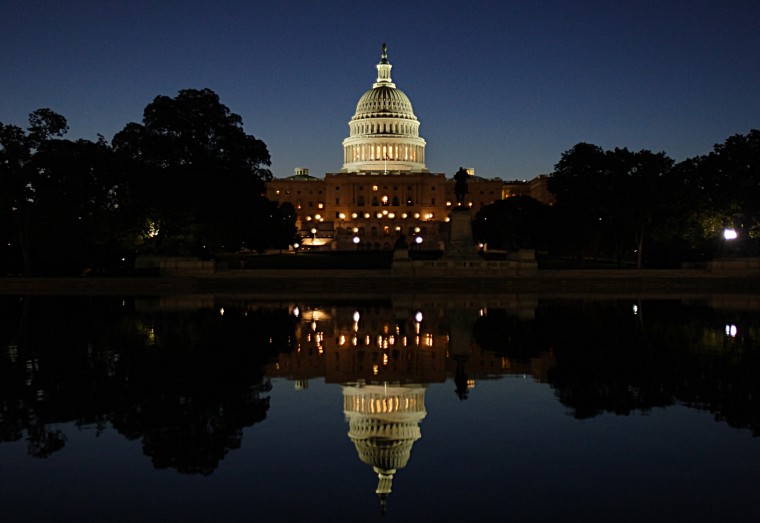If Americans elected a Republican White House and a Republican Congress next year, a sharp, national turn to the far-right would be obvious, but there would still be some limits. Most measures would still need Senate approval, and the most radical GOP ideas would struggle in the face of Democratic filibusters.
But what if a newly invigorated Republican majority decided to scrap legislative filibusters so GOP lawmakers could simply do as they pleased?
Late last week, Jeb Bush said he "would certainly consider" getting rid of filibusters altogether -- executing a new "nuclear option" -- in order to repeal the Affordable Care Act. Scott Walker was even more enthusiastic about the idea, saying he would "absolutely" pursue such a strategy if it helped him dismantle the nation's health care system.
This week, as Bloomberg Politics
reported, two more Republican presidential hopefuls -- Rick Perry and Carly Fiorina -- said they, too, would urge GOP senators to rewrite Senate rules in order to "repeal Obamacare."
Republican senators themselves, however, say they're not interested.
The Hill reported this week:
Senate Republicans appear to be closing the door on gutting the filibuster, brushing aside calls from GOP presidential hopefuls Jeb Bush and Scott Walker to consider lowering the 60-vote threshold for repealing ObamaCare. Sources close to Senate Majority Leader Mitch McConnell (R-Ky.) say there's virtually no chance he will go along with abolishing the filibuster, something he has strongly criticized in the past.
Even Ted Cruz is
cool to the idea, telling Hugh Hewitt this week, "I believe ending the legislative filibuster would ultimately undermine conservative principles." The Club for Growth also voiced skepticism.
In theory, that should effectively end the conversation, but there's still a little more to it.
For now, it's largely an academic exercise, speculating about a hypothetical. But imagine if Republicans found themselves in 2017 and 2018 in the same boat as Democrats for most of 2009 and 2010 -- American voters gave them control of the levers of power, but their agenda was stymied by the minority.
Is it possible that Republicans might change their mind about filibusters after a few months or years of Democratic obstructionism? Of course it is. Paul Waldman had
a good piece on this yesterday for the Washington Post.
[C]onsider this scenario. It's the spring of 2017, just months after Republicans achieved their victory at the polls. President Walker (or Rubio, or Bush) is moving to implement the agenda that he ran on. Republicans in Congress are eager to pass the bills they've been fantasizing about for the last eight years. And there's a full docket of them: tax cuts, a national ban on abortions after the 20th week of a woman's pregnancy, eliminating the Consumer Financial Protection Bureau, forbidding the EPA from regulating greenhouse gas emissions, lightening Wall Street's terrible regulatory burden, block granting safety net programs, and, of course, the repeal of the Affordable Care Act. Yet Democrats and their filibuster stand in the way of it all. It isn't hard to imagine that the pressure from Republican legislators, the party's base and a new president eager to make his mark, all of whom would be urging McConnell to get rid of the filibuster, would be overwhelming.
What's more, let's not discount the possibility that Senate Republicans are ... how do I put this gently ... fibbing.
GOP leaders are no doubt aware that their party's agenda is not popular and that the party overall has a well-deserved reputation for radicalism. It's in the Republicans' interest to leave Americans with the impression that policymaking in Washington is slow, difficult, and prone to gridlock. "We can vote for Republicans," mainstream voters are supposed to think, "because Democrats will be there to keep them from going too far."
And so, before the 2016 elections, GOP officials have an incentive to leave Americans with the impression that Republicans won't simply be able to run roughshod, passing every right-wing idea that pops into their minds.
But come 2017, would a powerful GOP controlling all the levers of power go in a different direction?
